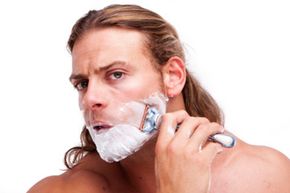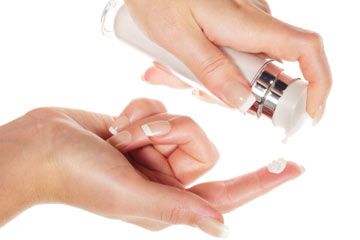Dry skin. It's red, it's itchy and it hurts. It's also hard to keep it at bay when the humidity and temperatures drop. Break out the lotions and the humidifier, and keep those hot showers short. Also, consider changing the skin-care products you use. Take your shaving cream, for example.
Shaving cream, whether you're shaving your face or your legs, helps to reduce the friction between your skin and the razor. It minimizes razor burn, and the warm water you use to lather up with helps to open your pores and soften stubble. Depending on the ingredients in the shaving cream you choose, it just might do even more -- like help to hydrate your dry skin.
Advertisement
Not all shaving creams are equal. Some soaps and shaving creams have fairly similar, and harsh, ingredients, and when your shaving cream is similar to your soap, you may be drying -- not moisturizing -- your skin. When it comes to solving dry skin problems, the last thing you want to do is wash your skin's naturally protective oils down the drain.
Our skin is made up of several layers, with the outermost layer called the epidermis. The outermost layer of the epidermis is called the stratum corneum. It's the stratum corneum that commonly dries out, and it's susceptible to everything from environmental factors and allergens to potential irritants such as shaving. And when we have dry skin, we increase our risk of irritation, inflammation and infection. Enter moisturizers.
Moisturizers increase the level of water in the stratum corneum. There are two types: humectant types such as glycerin and alpha-hydroxy acids, which attract moisture to the skin, and hydrophobic types such as petroleum jelly and lanolin, which boost the skin's natural lipid barrier and help reduce the amount of moisture escaping from the skin.
Shaving cream will moisturize your skin if it includes the right ingredients for the job. Look for options that aren't alcohol-based -- alcohol-based products will dry out rather than hydrate skin. Instead, look for emollient ingredients, such as the following:
- Jojoba oil
- Mineral oil
- Palm oil
- Coconut oil
- Shea Butter
- Lanolin
- Glycerin
- Petrolatum
- Sorbitol
- Urea
Oils are a great way to replenish the skin's natural moisture barrier, whether they come from natural or petroleum-based ingredients. Silicone-based ingredients such as dimethicone smooth and condition your skin and provide hydration, but they're controversial -- studies are underway regarding the safety of silicone-based polymers in skin-care products. Of course, there are also natural ingredients that are good moisturizers. Aloe vera and colloidal oatmeal, two of the most effective and most popular, both have anti-inflammatory effects and provide overall healthy skin benefits.
Advertisement



